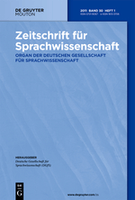
Zeitschrift fur Sprachwissenschaft
Scope & Guideline
Advancing the frontiers of linguistic research.
Introduction
Aims and Scopes
- Morphosyntactic Variation and Change:
The journal frequently publishes research on morphosyntactic phenomena, exploring how syntactic structures and morphological forms vary across different dialects and languages, particularly in German. - Language Processing and Acquisition:
Research that investigates how language is processed and acquired, especially among second language learners, is a key focus. This includes experimental studies on comprehension and production. - Cross-Linguistic Comparisons:
The journal promotes studies that compare linguistic features across languages, enhancing understanding of universal and language-specific phenomena. This includes the exploration of semantic and syntactic structures in various languages. - Pragmatics and Discourse Analysis:
Articles often delve into pragmatic aspects of language, examining how context influences meaning and the structure of discourse, particularly in narrative forms. - Historical Linguistics and Semantic Change:
The journal also addresses diachronic studies that investigate how meanings and structures of words evolve over time, contributing to the understanding of language change. - Gender and Language:
There is a noted interest in how language reflects and constructs gender, with studies examining gendered semantics and inclusive language practices in German. - Experimental Linguistics:
The journal features experimental approaches to linguistic questions, using empirical data to validate theoretical claims and explore complex linguistic phenomena.
Trending and Emerging
- Cognitive Linguistics and Construction Grammar:
There is an increasing focus on cognitive approaches to understanding language, particularly through construction grammar, which examines how linguistic structures are formed and understood in context. - Gender Studies in Linguistics:
Research exploring gendered language and its implications has gained traction, reflecting broader societal discussions on inclusivity and representation within language. - Experimental and Computational Methods:
The use of experimental methods and computational tools in linguistic research is on the rise, highlighting a trend towards data-driven approaches that enhance the empirical basis of linguistic theories. - Narrative Structure and Perspective:
Emerging studies are increasingly examining the nuances of narrative structure, particularly in how perspective influences meaning and understanding, indicating a renewed interest in discourse analysis. - Semantic Variation and Change:
There is a growing trend towards investigating semantic variation and its implications for language change, emphasizing how meaning evolves across different contexts and communities.
Declining or Waning
- Traditional Syntax:
Research focusing solely on traditional syntactic theories without integrating functional or cognitive aspects appears to be less frequent, indicating a shift towards more integrative approaches. - Phonology and Phonetics:
There seems to be a waning interest in purely phonological studies, particularly those that do not relate to broader linguistic contexts or do not incorporate experimental methodologies. - Historical Textual Analysis:
While historical linguistics remains a focus, the specific analysis of older texts without contemporary relevance has seen a decrease, suggesting a move towards more applied linguistic studies. - Descriptive Linguistics:
There is a noticeable decline in purely descriptive studies that do not engage with theoretical implications or cross-linguistic perspectives, as researchers increasingly seek to connect descriptions with broader linguistic theories. - Bilingual Acquisition Studies:
Research specifically centered on bilingual acquisition without addressing sociolinguistic variables or cognitive implications has diminished, reflecting a growing interest in more complex interactions in language learning.
Similar Journals
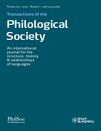
TRANSACTIONS OF THE PHILOLOGICAL SOCIETY
Bridging Theory and Practice in Language StudiesTRANSACTIONS OF THE PHILOLOGICAL SOCIETY, published by Wiley, is a prestigious journal focusing on the fields of linguistics and language studies. With a rich history that spans over 180 years, having been established in 1842, this journal continues to contribute significantly to the academic discourse on language and linguistics. It holds an impressive impact factor and ranks in the Q2 category for both Linguistics and Language in the 2023 category quartiles, underscoring its relevance and scholarly influence, as evidenced by its rankings in the Scopus database. Researchers, professionals, and students will find this journal invaluable for accessing high-quality research articles that illuminate various aspects of language and linguistics. While the journal does not currently offer open access, it remains a vital resource for anyone dedicated to advancing knowledge in these fields. Its address in the United Kingdom underscores its international reach and commitment to academic excellence.

Catalan Journal of Linguistics
Fostering Innovation in Linguistic Research since 2002.Catalan Journal of Linguistics is a distinguished academic publication dedicated to the dynamic field of linguistics and language studies. Published by the Universitat Autònoma de Barcelona, this open-access journal has been disseminating impactful research since 2002, making significant contributions to the understanding of linguistic theory, language acquisition, and sociolinguistics, particularly within the Catalan language context. With a robust engagement in the scholarly community, it proudly holds a Q2 ranking in Linguistics and Language as of 2023, reflecting its commitment to high standards of research and innovation. The journal is accessible to a global audience, promoting the free exchange of knowledge beyond geographical boundaries, and serves as an essential platform for researchers, professionals, and students aiming to stay at the forefront of linguistic inquiry. With its rich archive of articles, the Catalan Journal of Linguistics stands as a vital resource for anyone keen to explore contemporary linguistic issues and advancements.

Studi e Saggi Linguistici
Exploring Language Through Innovative ScholarshipStudi e Saggi Linguistici is a distinguished academic journal published by EDIZIONI ETS, based in Pisa, Italy. With its ISSN 0085-6827, this journal has established itself as a vital resource in the field of linguistics, particularly noted for its contributions since its inception in 2016. Although currently categorized in the lower quartile (Q4) by the 2023 metrics in the domains of Linguistics and Language within Scopus, it remains a significant platform for innovative research and critical discussions surrounding language studies. Focusing on both theoretical and practical aspects of linguistics, the journal serves as a nexus for scholars and practitioners alike, facilitating a rich interchange of ideas and knowledge in a rapidly evolving discipline. As an invaluable publication for researchers, professionals, and students, Studi e Saggi Linguistici is committed to advancing the understanding of linguistic phenomena and fostering scholarly communication in its field.

Verba-Anuario Galego de Filoloxia
Celebrating the Richness of Language through Rigorous ResearchVerba-Anuario Galego de Filoloxia is a prominent academic journal published by UNIV SANTIAGO COMPOSTELA, dedicated to advancing the field of linguistics and language studies. Hailing from Spain, this journal provides a vital platform for researchers, educators, and students interested in Galician philology and its broader linguistic implications. Although it operates under traditional access models, the journal’s commitment to quality research is reflected in its categorization within Q3 in Linguistics and Language for 2023, showcasing its significant contributions to the field. Encompassing a convergence period from 2017 to 2024, Verba garners attention in both the Arts and Humanities and Social Sciences domains, with its Scopus rankings highlighting its moderate impact within these categories. By nurturing scholarly dialogue and disseminating innovative studies, Verba-Anuario Galego de Filoloxia plays a crucial role in promoting linguistic research, making it an essential resource for professionals and academic institutions striving to explore the complexities of language and philology.
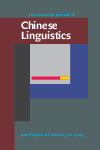
International Journal of Chinese Linguistics
Elevating Chinese Linguistics to Global StandardsInternational Journal of Chinese Linguistics is a distinguished publication that delves into various aspects of linguistic studies pertaining to the Chinese language. Published by John Benjamins Publishing Co, this journal stands out for its commitment to advancing the knowledge and understanding of Chinese linguistics within the global academic community. With an impact factor that places it in the Q2 quartile of linguistics and language, the journal is indexed in prominent databases, achieving ranks of #501 in Arts and Humanities and #580 in Social Sciences. These rankings reflect the journal's dedication to maintaining high scholarly standards and its relevance in both linguistic research and practical applications. While not categorized as Open Access, the journal provides necessary access through institutional subscriptions, thereby ensuring that valuable research reaches a broad audience. Covering a wide range of topics from syntax and phonetics to sociolinguistics and applied linguistics, the International Journal of Chinese Linguistics serves as an essential resource for researchers, professionals, and students seeking to deepen their understanding of the intricate relationship between language and culture in the Chinese context. With converging years from 2019 to 2024, it continues to evolve, reflecting ongoing developments in the field.
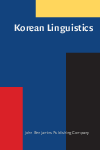
Korean Linguistics
Exploring the Depths of Korean LinguisticsKorean Linguistics is a premier scholarly journal dedicated to the exploration and advancement of the field of linguistics, with a specific focus on the Korean language and its various dimensions. Published by John Benjamins Publishing Co., this journal is a vital resource for researchers, linguists, and students seeking to deepen their understanding of Korean linguistics and its contextual significance. With an ISSN of 0257-3784 and an E-ISSN of 2212-9731, Korean Linguistics has gained recognition for its rigorous peer-reviewed articles and contributions to the academic community, evidenced by its current ranking in the third quartile (Q3) of the Linguistics and Language category. The journal aims to foster scholarly dialogue and disseminate innovative research methodologies, theoretical advancements, and empirical studies spanning from 2022 to 2024. Although it does not operate under an open access model, its impact on the understanding of Korean linguistics remains significant, making it an essential publication for anyone keen to engage with contemporary issues and developments in this specialized field.
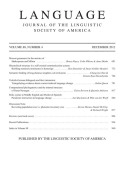
LANGUAGE
Pioneering Research in Linguistics and LanguageLANGUAGE, published by the Linguistic Society of America, is a premier academic journal dedicated to the rigorous study of linguistic theory and practice. With an ISSN of 0097-8507 and E-ISSN 1535-0665, this esteemed journal has established itself as a leading publication in the field of linguistics since its inception. The journal has consistently maintained a high impact factor, being ranked in the Q1 category in Linguistics and Language for 2023, placing it among the top tier of academic journals. Notably, it also holds impressive Scopus rankings, being positioned at #75 out of 1088 in Arts and Humanities, and #89 out of 1167 in Social Sciences, demonstrating a significant impact and reach in the discipline. While it is not an open-access journal, LANGUAGE provides crucial insights into linguistic research, fostering a vibrant academic community. Spanning years from 1996 to 2024, it continues to be an essential resource for researchers, professionals, and students alike, aiming to advance the understanding of language in its myriad forms and functions.
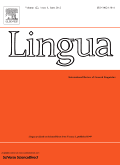
LINGUA
Unveiling the complexities of language through rigorous scholarship.LINGUA is a premier academic journal dedicated to the field of linguistics, published by ELSEVIER and based in the Netherlands. With an ISSN of 0024-3841 and an E-ISSN of 1872-6135, this esteemed journal has garnered a reputation for excellence, evidenced by its position in the top Q1 quartile in Linguistics and Language as of 2023. LINGUA serves as a vital platform for scholars, researchers, and students, showcasing innovative research and critical discussions across various linguistic subfields. The journal has demonstrated impressive Scopus rankings—151 out of 1088 for Language and Linguistics, and 176 out of 1167 in Social Sciences—placing it in the 86th and 84th percentiles, respectively. By providing a forum for the dissemination of advanced linguistic theories and their applications, LINGUA continues to significantly contribute to the academic community, making it an essential resource for anyone engaged in the study of language.

Lingue e Linguaggio
Advancing Linguistic Knowledge Through Rigorous ResearchLingue e Linguaggio, published by SOC ED IL MULINO, is a distinguished academic journal in the field of Linguistics and Language, hailing from Bologna, Italy. With an esteemed Q2 ranking in its category as of 2023, this journal is recognized for its contributions to both the arts and humanities as well as social sciences, achieving notable positions within Scopus rankings. It serves as a vital platform for researchers, practitioners, and students interested in exploring various linguistic phenomena, language dynamics, and theoretical frameworks. Although it operates under a traditional subscription model rather than open access, its comprehensive array of studies and publications provides significant insights and fosters academic discourse. With a publication period extending from 2002 to 2024, Lingue e Linguaggio continues to be a key resource for advancing the understanding of language in contemporary contexts.

Language and Linguistics Compass
Fostering Scholarly Dialogue in Linguistic DiscoursesLanguage and Linguistics Compass, published by Wiley, stands as a premier journal in the field of linguistics, showcasing innovative and interdisciplinary research. With its ISSN 1749-818X and E-ISSN matching, the journal has built a robust reputation, achieving an impressive Q1 ranking within the linguistics category for 2023, placing it in the top 4% of its field. Its Scopus rank of 48 out of 1167 highlights its influence and significance among linguistics journals, boasting a commendable 95th percentile. This journal serves as a vital resource for researchers, professionals, and students, offering a wide range of accessible articles that illuminate current trends and advances within the domain of language studies. Although it is not Open Access, the journal is committed to quality and diversity in its publications, ensuring scholarly articles from various sub-disciplines of linguistics are represented from 2008 through 2024. Located in the United Kingdom, Language and Linguistics Compass invites contributions from around the globe, reinforcing its status as a leading forum for linguistic discourse.